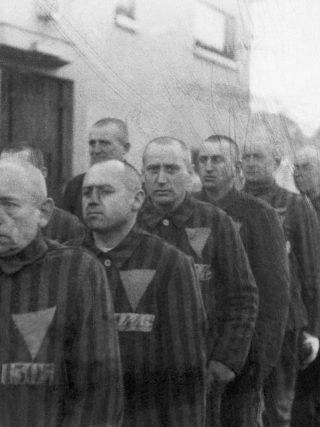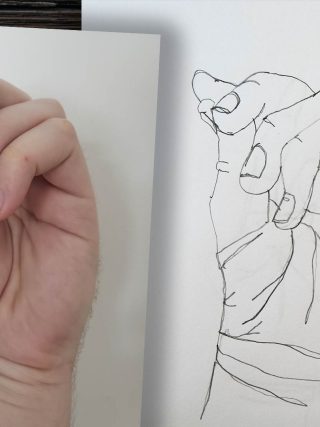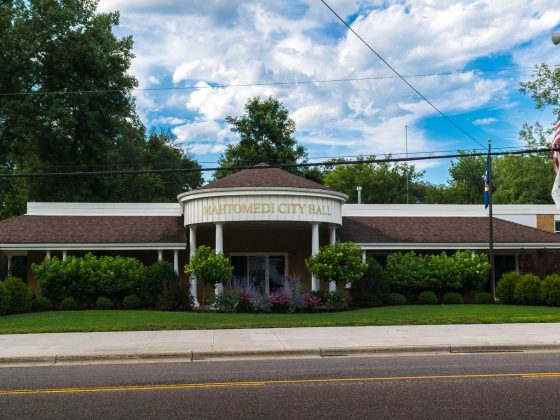Data practices requests to the city of Mahtomedi uncovered what appears to be several violations of a government contract between the city and its independent contractor. The city approved a resolution on September 7, 2021 to permit hunting by Metro Bowhunters Resource Base (MBRB) for the purpose of deer management activities within residential areas. The accompanying contract was signed on September 29, 2021 by MBRB board member and liaison, Joe Palen.
The contracted “sharpshooters” were slated to kill deer to reduce the overall herd population on three groups of dates (October 14-16, November 5-7, and December 10-12) in three different zones within the city, one that was shared with the city of Birchwood. These included a parcel between Wedgewood Drive and Birchwood Avenue, an area between the Dwinnel Nature Area and Quail Street, and Katherine Abbott Park. The latter is public land that remained shuttered and unusable to park-goers during the hunt dates.
According to the public documents obtained, the contract stipulated that no hunting could take place until the city was provided with Metro Bowhunters’ certificate of general liability insurance. The selection of the qualified archers that were to participate in the deer hunt, as well as the names and addresses of the qualified archers, were to be furnished to the city liaison, Jerene Rogers, prior to the commencement of the first scheduled deer hunting event. The contract also required Metro Bowhunters to obtain written releases of liability from each hunter and deliver these releases to the city.
Also per the contract, both parties signed that the agreement should be governed by and construed in accordance with the laws of the State of Minnesota. By de facto, this would also appear to include Minnesota Statutes Chapter 13 (Government Data Practices). Under the Minnesota Government Data Practices Act (MGDPA), all government data collected, created, received, maintained or disseminated by a government entity should be public unless classified otherwise. Furthermore, the city failed to include the required notice in its contract that the Data Practices Act applied to its contractor – Minn. Stat. § 13.05, subd. 11(a). Failure to include this notice does not invalidate its requirements (Helmberger v. Johnson Controls, Inc. [839 N.W.2d 527]).
The city received four requests for government data pertaining to its deer management plan and hunt-related activities on September 21, 2021; October 7, 2021; November 8, 2021; and January 8, 2022. These requests were timed before, during, and after the hunt to ensure all requested data was provided. When it became apparent that some of the data was not in possession of the city, Metro Bowhunters received a data request on December 23. 2021, while the group was still under contract. The term of the agreement was from September 7, 2021 through December 31, 2021.
At that time, the group was also asked to provide its public disclosures and exemption application required of non-profit organizations underneath federal IRS tax code. According to the IRS website, copies must usually be provided within 30 days of written requests, and immediately for in-person requests, or face daily fines for noncompliance. If the failure to comply was deemed willful, penalties could be $5,000 per return or application.
Metro Bowhunter’s attorney, Tim Keane of Kutak Rock LLP, claimed that these public disclosures were private information, writing that requests “included certain information… including tax filings, that a private organization considers private.” However, there’s a problem with that argument, as Metro Bowhunters Resource Base, Inc. was listed as a 501(c)(3) public charity according to Publication 78 data. As such, exempt organizations must allow for public inspection and copying of their exemption applications, determination letters, and annual returns.
However, Keane’s response on behalf of the bowhunters stated: “[W]e do not intend to provide you with more information than the city has already provided you.” Both the organization and their attorney failed to respond to subsequent communications that requested these disclosures. Does this establish a willful pattern of behavior? At the time of publication, none of the requested public disclosures were provided to the requestor.
How could a breach of contract happen?
The first hunt date commenced on October 14, 2021. Data from multiple requests show that the city was not in possession of the certificate of general liability insurance until December 8, 2021, which was well after six different hunt dates were completed and 28 deer were killed. Similarly, government data shows that the city did not have the names and addresses of the participating hunters, nor the signed liability waivers, until November 30, 2021. One might question whether this lack of data was intentionally orchestrated after the city received its first data practices request.
Bridget McCauley Nason, the city’s attorney, clarified that the certificate of liability insurance and names of hunters were forwarded to the data requestor upon receipt. The fact that the contract stipulated this data, that the city was aware of requests for this data, and that the city was not in possession of this required data raises many questions.
It also raises larger questions about the oversight and management of the hunts. Data showed that the city of Mahtomedi had no official record of the full legal identities of the volunteer sharpshooters or their qualifications to use dangerous weapons in residential areas while carrying out lethal hunting activities.
Furthermore, the data the city did have showed discrepancies. The city planned for hunts in three zones, yet only had data on hunters who were in two, claiming that hunting only occurred on the Birchwood side. This doesn’t retroactively negate the potential for hunting to occur on the Mahtomedi side of this parcel, as it was communicated to the community. The city had no data concerning those individuals.
Additionally, the city was only provided some contractual data after it was necessary to be in possession of it. There were ten hunters listed on a file of names and addresses sent to me. There were 11 liability waivers that showed signatures, many illegible. Unsettlingly, there were 11 names shown on the final summary report of hunt data, three of whom were not listed on the other two data sets. These three did not have signed liability waivers or provide addresses to the city by the conclusion of my data request in March 2022, long after the expiration of the contract. This gives cause for concern.
It also raises questions about the enforceability of the supplied liability waivers that were allegedly redacted by Metro Bowhunters, which blot out names of public government volunteers. Are these releases of liability enforceable should an incident have occurred? Furthermore, what liability was created on the part of the city by not having these necessary documents prior to engaging in hunting?
Providing anonymity to armed government workers
It is important to note that the city does not appear to have known who its armed volunteers were at any point during the hunts. Rather, it appears that the city council actively did not want to know this information. Video of the January 18, 2022 city council meeting showed several members of the council actively seeking ways to keep the city from having to disclose that data rather than addressing the poor enforcement of its contract with the sharpshooters.
Jane Schneeweis asked Keane if the group was in a position to change the classification of public data to private–something neither the hunters nor the council had the authority to do under Minnesota state statutes.
Previously, Schneeweis had been advised by the city attorney that the names of its volunteers were classified as public data. During this interaction, Schneeweis continued to ask Nason clarifying questions about the council’s role in determining data to be private, concluding with, “I would prefer that we didn’t have to release those names. That’s what I would like to see, but I also feel we’re in a legal situation where I think it’s prudent to ask [the Data Practices Office] for their opinion. And, all I can do is hope that they might come down on that side.”
“This is a tough deal,” Dick Brainerd followed-up, who saw the release of this public data as “a potential problem.”
“I’d love if you’ve figured out a way to keep this private,” Luke Schlegel said. “Please share. Help us.”
Although the city drafted a request to the commissioner of the Data Practices Office to determine the proper classification of the hunters’ names, Metro Bowhunters withdrew its objection “so as to eliminate the need for a Mahtomedi request to the state for an advisory opinion.” The request for an opinion would have set a precedent for all future data practices requests regarding data classification.
Instead, H.F. 4603 was authored in response by Rep. Becker-Finn, a Democrat who previously legislated to make more data on police public and advocated for stronger gun control measures. This new bill would provide almost complete anonymity to those who provide weaponized services on behalf of the government to manage wildlife populations. Paradoxically, Becker-Finn’s legislation seems to be at odds with itself–and potentially her constituents.
While it appears that the city has a problem ensuring its contracts are carried out according to their terms, it is uncertain whether the city will address the sloppy nature of its contracts in the future. Will the city of Mahtomedi fix the problems that were observed with its 2021 hunt and hold Metro Bowhunters accountable to its government contract? More importantly, can citizens trust Metro Bowhunters to obey all other terms of its contract if the group could not deliver on simple paperwork requirements in preparation?
It does not appear that this is the first time that Metro Bowhunters has struggled with fulfilling its obligations. Palen’s November 28, 2020 last-minute email to selected hunters read, “Sign scan and email back asap (sic).” The first 2020 hunt in Mahtomedi and Birchwood began less than two days later on the morning of November 30. One of the redacted waivers obtained was never dated, raising questions about its validity and about the city’s records management practices.
This is not the only challenge on the part of the bowhunters. Public data from 2019 shows the organization enrolls “over 750 volunteer hunters annually.” Verbal statements to the Birchwood City Council the same year revealed 850 members. In 2021, a notice on the group’s website told users that no applications from new volunteer hunters would be accepted, citing that enormous growth “brought many challenges, not only for our organization but for our landowners as well.” What were these challenges? What other problems does Metro Bowhunters have that the public is not aware of?
It is for this reason that the Data Practices Act exists: to create a layer of transparency for how government work is carried out. In recent months, bowhunters have lobbied for the Minnesota Legislature to change laws in favor of their special interest groups. According to other local papers, Metro Bowhunter’s president, Deb Luzinski, advocated for laws that would bypass the Data Practices Act, seeking to carve out unprecedented privacy exemptions not afforded to other government workers and volunteers, including police officers, firefighters, and teachers.
Those efforts were furthered by the national Sportsmen’s Alliance, based out of Columbus, Ohio, a group that has historically lobbied against listing and protecting endangered species from hunting. The group also has a history of labeling its critics and opposition as “radicals” and “extremists,” fronted by its vice president of communications, Brian Lynn. The Sportsmen’s Alliance appears to be connected with Metro Bowhunters and have drawn national attention to transparency statutes they deemed to be “loopholes.”
These communications appear to be nothing more than a fear-mongering technique to skirt public accountability measures and legislate less oversight of their special interests. To be clear, all hunters’ data is classified as private when registering for a hunting license. All hunters may hunt privately and are guaranteed the right to privacy of their activities. However, when an individual provides hunting as a service to the government, his or her name is classified as public to ensure complete transparency of operations to the public, just as it should be.
With the legislation that was proposed, the question must be asked: are citizens comfortable with providing complete anonymity to armed individuals acting on the government’s behalf?
Furthermore, there also appears to be no central oversight of Metro Bowhunters’ activities, the lack of which would effectively allow them to set their own standards and police themselves. According to its contract with Mahtomedi, MBRB determines the qualification standards of its hunters, not the city. Unlike driving tests, teacher proficiency exams, CPA exams, and other tests that require a wait period, Metro Bowhunters allows its hunters to take proficiency tests once per day. Hunters are not required to complete a field day as part of their bowhunter education training. Instead, the safety course is completed online.
Because many communities rely solely on the MBRB’s near monopoly of urban hunting, there exists little incentive to hold the group to higher standards or for communities to seek other alternatives for managing their deer populations.
If the Mahtomedi deer hunt is any indication, how many other communities have no record of the most pertinent information? One might reasonably assume that the city would have each hunter’s sharpshooter proficiency results, documented proof of necessary licenses to serve in such capacity, and detailed logs of hunter events on each day. The latter would be of interest, especially for studying and understanding the behavior of its deer population for the future. None of these were found in the data obtained from the city.
The data seems to show an interest in supplying pseudo-recreational hunting opportunities under the guise of providing “deer management.” This appeared to be the case when Keane, on behalf of MBRB, alleged that the hunters were “recreational” and should be classified as such. Nason disagreed in her draft request for an advisory opinion to the commissioner of the Data Practices Office.
Nason wrote: “The deer hunt is not administered by the City as [a] recreational or social program, but rather is a strategy adopted as part of the City’s Deer Management Program and implemented by a separate non-profit organization pursuant to a contract between the City and the non-profit organization. While the hunters themselves may enjoy the benefits of being able to engage in hunting activities, which may be viewed by the individual participants as a social or recreational activity, the names of the hunters are not maintained for enrollment purposes for participation in a city-sponsored recreational or social program.”
Ironically, Metro Bowhunters’ own literature specifies that “MBRB hunts are not set up to provide recreational opportunities for bowhunters – the hunts are a service to the landowners in order to control deer populations.” Yet, this did not stop the group from trying to classify its rendered services as private recreation, which is directly at odds with how MBRB publicly identifies the people it serves as “clients” and “customers.”
Perhaps the public needs to question the main function of the bowhunting group. Is it public service, as advertised, or is it just a front to provide close and convenient hunting opportunities to its members?
Given this information, are Metro Bowhunters showing honest intention with the communities they are privileged to serve?
Furthermore, if the city of Mahtomedi has a problem ensuring all necessary paperwork is obtained before allowing hunting in residential areas, what other problems exist within the city’s governance?
This article is a part of a series related to problems with the deer management in Mahtomedi and the city’s seemingly poor records management practices. For more information please see:
- Mahtomedi and Bowhunters Skirt Public Accountability (shorter read – overview)
- Metro Bowhunters Appear to Breach Contract With City of Mahtomedi (shorter read – contract and data practices)
- Disquieting Records Management Issues Uncovered in Mahtomedi (full report – problems with obtaining data, maintained records, and lack of oversight into the hunts)
- How Mahtomedi Failed to Implement Effective Deer Management (full report – an examination of various studies, mitigation strategies, and difference between effective strategies and Mahtomedi’s deer management plan)





